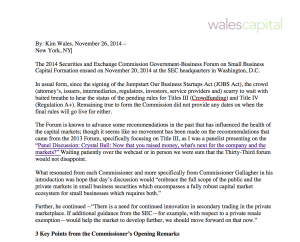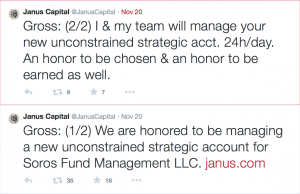July 27, 2014 — New York, NY
When microbrewery owner Saburo Setsuda needed to replace a bottling machine last year, his bank said no to loan but introduced him to a Tokyo firm that helped him raise funds online.
In January, the first time Mr. Setsuda tried crowdfunding, which lets Internet users put money toward projects or companies in return for a cut of profits, he raised nearly ¥4 million in just 18 hours. The funds went for a new bottling machine to pack beer flavors like blueberry and brews made from hot-spring water from this area in central Japan. The second time, in March, he raised ¥1.2 million for a refrigerator.
In May, lawmakers passed legislation in Japan—similar to the U.S. JOBS Act (Jumpstart Our Business Startups), which increases the number of investors a private firm may have—to make it easier for companies to provide these services online.
When crowdfunding emerged, after the 2008 financial crisis, many investors simply used crowdfunding sites to donate a couple of hundred dollars to projects they found worthy. Now, more are showing interest in platforms that give participants a return on their money.
In Japan, where Prime Minister Shinzo Abe is trying to jump-start economic activity, politicians have viewed crowdfunding as a way to nudge some of the trillions of yen in household savings out of low-yielding deposits and into the hands of entrepreneurs.
In May, lawmakers passed legislation—similar to the U.S. JOBS Act (Jumpstart Our Business Startups), which increases the number of investors a private firm may have—to make it easier for companies to provide these services online.
Just over half of the ¥1.6 quadrillion ($15.7 trillion) in Japanese household assets are in cash or at banks. Only 11% is in stocks or bonds, compared with 42% in the U.S. and 23% in Europe, according to the Bank of Japan.
Meanwhile, strict regulations keep banks from extending credit to some firms, which may have a good business idea but other issues, such as debt, that prevent lenders from funding them. Banks are lending out less than 70% of the deposits they hold.
Normally, that is where venture capital might step in, but economists say Japanese firms tapping crowdfunding often prefer to remain relatively small, and aren’t looking for Silicon Valley-style backing, which tends to be aimed at companies targeting large-scale growth.
Crowdfunding is still small in Japan, estimated at ¥8.2 billion, or $80 million. Meanwhile, the global market, which was less than $1 billion in 2010, was estimated to reach $5.1 billion in 2013, with the North American market accounting for $3.7 billion, according to a report the research firm Massolution published in April last year.
In Japan, the most well-known crowdfunding companies offer investors annual returns ranging from 2% to 10%, with the average at 5%. Investors are repaid over a few months, or as much as a few years. They run the risk of not being paid at all if the company they are backing fails.
Skepticism about promised returns is a hurdle to attracting more investors. After decades of near-zero interest rates on savings deposits, many investors are suspicious of pledges of returns of 4% or 5%.
“Because interest rates have been so low at financial institutions, Japanese people began to believe that interest rates were something supposed to be low,” said Kaz Ohmae, who started the crowdfunding platform Crowdbank.jp in December. “We have to change that perception.”
Crowdbank.jp provides funds to small firms in Japan and overseas and lists an average 5.2% return on its website. In just half a year, the company has received more than ¥650 million in investments for companies it serves and is shooting for ¥10 billion in the next few years, Mr. Ohmae said.
Yasuyuki Yabumoto, a 43-year-old telecom worker with two decades of investment experience, has put ¥1 million in crowdfunding via Mr. Ohmae’s company since April. He is planning to invest more but wants to go slowly.
“At this stage I’m carefully assessing crowdfunding’s risk and return, especially the default rates of companies that receive investments,” said Mr. Yabumoto, who also invests in stocks, currencies and bonds.
Many early-bird crowdfunding investors have prior investment experience. Nanae Obara, who works in the financial industry in Tokyo, said the ¥400,000 she has spent on crowdfunding over the last two years has been a way to diversify her portfolio of stock and investment-trust holdings.
Some politicians have expressed concern about risks, and the law passed earlier this year requires that crowdfunding companies provide adequate information about investments online. Still, there is also optimism that crowdfunding could help individual investors earn more on their savings.
More money flowing to firms in rural Japan could cut their dependence on government subsidies, said former Economy Minister Motohisa Furukawa. Mr. Furukawa helped launch a government debate on crowdfunding after seeing how online fundraising helped companies in areas of northern Japan affected by the 2011 earthquake and tsunami disasters.
Rather than feeling threatened by the potential competition from crowdfunding companies, many of Japan’s small lenders are excited.
“There is a lot of need from companies who have good ideas, but not good finances. It seems contradictory, but it’s hard for us to give them money,” said Keishi Furusato, who works in the loan and company-support division at Hida Credit Cooperative, the lender that introduced Mr. Setsuda, the brewer, to crowdfunding.
Though Hida Credit Cooperative doesn’t put up any money in crowdfunding arrangements, the hope is that companies that benefit and thrive will come to them in the future for loans. Mr. Furusato said that three to four other firms in Takayama, a town of 92,000, look likely to start crowdfunding soon.






